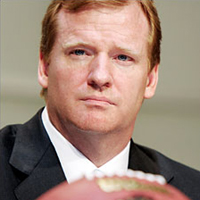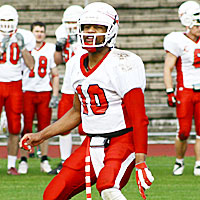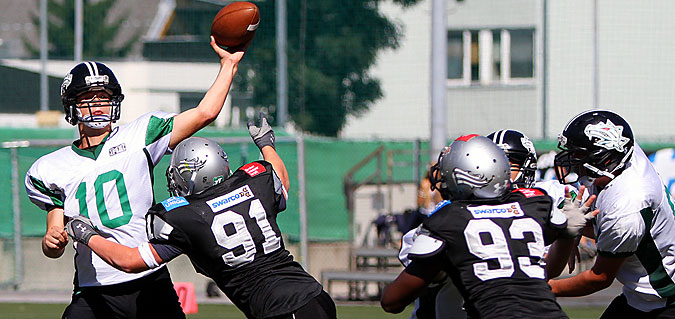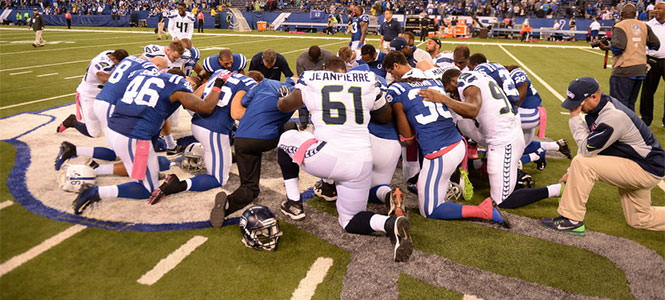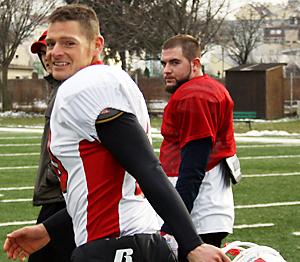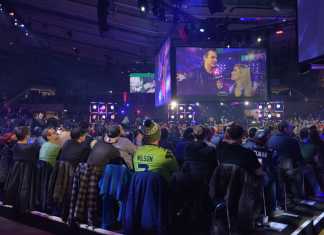Q: How serious is the NFL about putting a team in London?
Roger Goodell: The next step that we would take would be multiple games in a season before we do that. They tell us that we could sell this game out five or six times over. We think there’s a tremendous interest in either playing two games here in London or playing somewhere else in the UK. So we’ll probably take that step sometime in the next year or two.
Would there have to be two teams here full time?
If we had a franchise here? No, I don’t think so. We’re not looking at it that way. I will say you’re probably a little bit ahead of us. We haven’t started with that premise.
Have you met resistance about fans surrendering a home game?
Yes. It’s one of the biggest negatives to do this in the current structure that you do take a game away from the home fans. It’s tough on those teams when they do it and more importantly, tough on the fans.
Would it help if the schedule was 18 games?
It does because you have more quality games. That’s the whole premise of an enhanced season. It’s clear that the preseason games aren’t popular, either on this side of the pond or that side of the pond. They just don’t want to see them and they know the quality that they’re going to get when they do get preseason games. That would obviously add the inventory in which case, at least fans, if we did take a regular season game away, would be no worse off.
Did the quality issue doom NFL Europe in the UK?
We had great success with NFL Europe when it was called the World League the first year. We averaged close to 50,000 the first year with the London Monarchs. It was a tremendous success. When we went idle to restructure the league and make it into a European league and came back, that’s when it started to nosedive. I think people recognized that the quality of play wasn’t up to standards. I think that’s one of the things that we did several years ago. Mark Waller was instrumental in rethinking our strategy about bringing quality content and quality games, and that’s what we’ve focused on. People want to see – the more educated and the better fan they become, the more they want to see the best football, and that’s why we’re focusing on the regular season International Series.
Why not use Germany as your starting point for a European league?
Quite honestly, that’s what we were really focused on. Five of the six teams in NFL Europe at the end were there, so we had a major focus. The real core of it was that the media market in Germany didn’t develop with it, at least from our perspective. We couldn’t get the kind of media coverage that you really need to have a successful league.
If the media market grew, could you see a Northern Europe division?
Yes, you could. You’ve got to have a long term vision.
Is that the long term vision?
I think you take this all in steps. Clearly, we would love to bring football to more people and we know there’s a tremendous fan base over here. How we reach them is a critical component. I think we want to take each step and if we have success at that step, then we’ll go to another step. But there’s nothing wrong with that idea and that vision.
On John York’s contribution as part of the International Committee:
First, he’s chairman of the International Committee. He obviously works with our staff, both Mark and Chris Parsons, and myself in identifying the strategies and steps we want to take. He works with the ownership to make sure that’s consistent with where they want to go. He’s represented us overseas. He told me today he’s been here three times this year. He takes it very seriously and he’s been very helpful to us.
On the recent move to increase discipline for hits to the head:
We’ve been focused on this for the last several years about making rule changes that will take certain techniques out of the game. I think we’ve been very successful at it. It’s not the first time we’ve done something similar to what we did last year. In fact, I think it was two seasons ago we sent a very similar memo to the clubs saying there are still violations of these rules and these techniques are still being used, and you’re being warned right now the discipline will increase. It was very similar to what we did last week. And it wasn’t a rule change. It was simply saying that they’re still violating the rule and we’re going to start disciplining. The competition was great last week. There were none of those types of hits. The players adjusted and coaches adjusted. The game adjusted. It was the kind of competition that we’re looking for.
Are you concerned with how big and fast and strong players ar
Sure. This isn’t something that just happened in the last three or four years. Throughout our history we have looked at rules and techniques and taken them out of the game. Go back to the head slap, the clothesline, the chop block, or the horse collar more recently. There’s always been techniques that sort of develop. My guess is they develop potentially in other levels of football or the coaching style or players just develop this as a concept that they think helps them perform at a higher level. We identify those through our studies and we make a rule change to try to eliminate them from the game. And I think we’ve been quite successful at it. But it’s clear, even though you have a rule, sometimes they’re going to get violated. And unfortunately we’ll have someone who will violate this rule again I’m sure, but we’re on record now that there will be more serious consequences.
On the importance of changing the culture of the game and setting an example for other levels of football:
It’s very important for us. We recognize we play a leadership role and I think you saw it last week. I think I read that three college players were suspended for at least a game. I’m not saying it’s because of what we did and the focus we had, but I’m sure it was a contributing factor of some type.
On the criticism of the 18-game season with the focus on concussions:
Remember, it’s a 20 game format. We’re playing 20 games right now – just 16 and four. What we’re doing is evaluating and working to see what other changes we can make because of the quality of what we’re doing in those four games. Unfortunately, the players get injured in preseason games also, and that’s even more frustrating. The players are the first ones to say, we don’t like the preseason games. The fans clearly don’t like the preseason games. So we have to adjust to what’s happening in the game of football and try to do it in a way that’s responsible and considers all factors including the health and safety issues. We have to come up with something that works better. We’ve considered a variety of different alternatives and we think this is something that merits a tremendous amount of consideration.
On whether the NFL see the need for a developmental league and whether there has been any talk with the UFL about supplying that:
There’s different view points on that. Some football people think that it’s great to have a developmental league. Some people would rather not have a developmental league and would rather have more people in their camp. One of the things with the 18 and two season potentially is would you have larger rosters, including practice, or active rosters. A lot of coaches think that’s a better way to develop players than having a developmental league. There are also some concepts where you could have some sort of a combination, and you could even have a split developmental league where you play some in the spring, let them go into camps, and those that don’t make it come back and play in a developmental league in the fall. Those are all things that we’re evaluating in the context of 18 and two. I don’t know if we’ve drawn a conclusion on it. There was some discussion with the UFL probably a year ago, but there hasn’t been in quite some time to my knowledge.
Would having a developmental league alleviate concerns about injuries over an 18 game season?
I don’t think it alleviates the desire for us to try to limit injuries. That doesn’t change anything. If you have injuries, it gives you a greater pool potentially, yes, and develops players. One of the criticisms of reducing the preseason games from a pure football perspective is how do you develop the young players? How do you give them the time to develop their skills and identify them, because they’ll have less playing time. We’ve addressed that to some extent in some of the thinking about maybe bringing the younger players in earlier for camp and giving them the chance to compete against one another, or maybe have larger rosters for some period of time, and then you get a chance to evaluate the players. Preseason camp is really about evaluating players, developing players and making sure everyone’s in football shape.
On player concerns about a lockout related to Bob Batterman:
Bob Batterman is an outstanding labor attorney. He has not only represented the NHL, he’s represented many other organizations and reached successful conclusions without a lockout. We’re not going to be told who to be represented by. We’re going to get the best representation and he’s an outstanding attorney.
They’re calling him Bob ‚Lockout” Batterman.
They can call him anything they want. His intention is to get labor agreements that work for both sides and I think he has an incredibly successful record on that front. The other issue is both sides are going to be prepared for all alternatives. That’s what they should do. Anyone who gets into a negotiation and is not prepared will probably not be successful. I’m sure the players have been making preparations. They’ve been talking about how they’ve been doing that for some period of time, and the owners will be doing the same.
How would you characterize the CBA negotiations right now?
I’ve been reluctant to characterize because it doesn’t really serve any purpose. There are discussions going on. As I keep saying, it’s not just about discussions. It’s about progress, and I would like to see more progress. I think everyone has an interest in getting it done sooner rather than later. We’ve been very clear about the fact that the longer it goes, the harder it gets. We’ve also made the point that revenue will start decreasing. It probably already has in certain categories. As that revenue decreases, it’s less money to be able to negotiate over. So it will be harder to get a labor agreement at some point. Plus, and I think you’re seeing it already with the decertification, they’ll pursue litigation strategies. I’ve often said this is going to be about collective bargaining.
Is the Draft the last event to be done in 2011?
Yes. That’s a fair way to put it.
This upcoming Draft will be in April?
This one will. We’ve discussed whether long term we change the date and change the offseason calendar as part of a discussion of an enhanced season. There are some ideas that that might be an intelligent thing to do. But it won’t change a significant timeline.
On whether the main issue with the CBA is too much money going to the players:
The biggest change in the NFL economics over the last 15 years is the investment in the stadiums. The clubs are making more and more private investments in those stadiums. In addition, then they have to maintain those stadiums in many cases. That’s a financial obligation that they didn’t have. Then the third, which is starting to hit us with new stadiums that have been on line for 10 or 15 years, is they have to upgrade those stadiums – capital expenditures, which is an extraordinary amount of money in addition to that. Those are expenses that we’ve never had before. It’s not something that I would overlook. There has not been a stadium agreement since the 2006 CBA was signed. The only stadiums that have been built were on line or already on the ground – Kansas City, Dallas and the New York stadium – since 2000. Since this new CBA was put in place, it makes it even more challenging to get a stadium built, and then you add the economy on top of it. It’s a difficult environment to get stadiums built and that is sort of the core – the investment that the ownership is making to generate revenue.
On confusion for the fans that the owners insist on new stadiums that become an albatross due to the expense:
I think they’re great for the fans. It’s just that the finances are no longer on the public sector. That’s what it used to be. A lot of these stadiums are being moved to privately run facilities. That’s fine, it’s just a transition. But that transition is changing the economics for the owners.
On the G3 program and a potential new loan program for stadiums:
We’re not really looking at the concept of the G3 program through the same lens. I think we’re looking to try to make sure that whatever investments we make will have sufficient credit so that the financing of these stadiums can be done in a responsible fashion. So we haven’t really looked at the G3 program and said, how do we make G4? So what we’re trying to do is come up with an economic system that will encourage or incent clubs to invest in these stadiums, which is good for everybody, most specifically the players, and grow the game and the opportunities. That’s the kind of thing we’re doing. That’s why I say since 2006 we haven’t had a new stadium – it’s pretty clear that the current agreement that we’re coming to the close of is not encouraging that kind of investment. That’s bad for everybody.
On the 49ers specific circumstances and lenders waiting to see that loan come through before committing their own money:
It’s not just the loan, it’s the CBA. I think you’re focusing too much on the loan and not the CBA. That’s what they’re concerned about. They want to make sure that the CBA is something that will allow them to finance this and it’s challenging in this environment.


